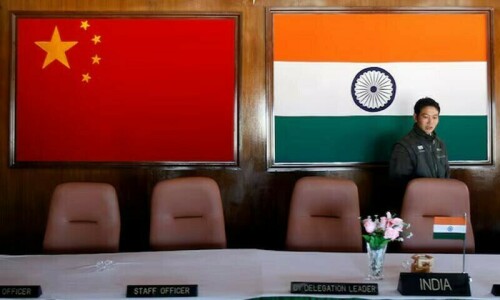I went to the condemned man's home in the afternoon and stayed there until his body arrived from the prison at dawn. I don't know what went through his mind when the hangman was taking him to the gallows. I wonder how he felt dying when everything in his body told him that he was fit to live for many years. He was in his twenties when hanged. He had a strong body, a healthy mind, a young face and jet-black hair. His limbs were strong, his veins were full of blood, his eyes were shining, his heart was beating vigorously and yet he had to die.
The Zia government said this PPP worker was involved in a hijacking. It was back in the 1980s when General Zia ul Huq ruled Pakistan. He never pardoned a condemned prisoner (except a set of rapists), not even the country's former Prime Minister Zulfikar Ali Bhutto.
I don't know whether this young man from Rawalpindi was guilty but the general's court found him so and ordered that he be hanged. The death of a young person, whether stabbed in an alley, killed in a battle or hanged on the gallows, is painful. At least that's how I feel. To me ending something as beautiful as a young life will always be painful.
When I arrived there with a group of journalists, we were first made to sit outside his home under a shamiana. His family received us with courage.
They were trying not to think about him and his death cell. Instead some of them even tried to discuss trivial things like politics and weather. But the fear of the inevitable was always there. In fact its presence was felt even more when it was not discussed.
For a few minutes everybody tried to act normally. The visitors pretended as if they were there for a social call. The young man's relatives spoke to them politely. And then right in the middle of a conversation someone would start sobbing and the whole facade came tumbling down. The grim fact that they were there to mourn a man who was not yet dead came out with all its ugliness and everybody tried to hide the painful embarrassment of being so helpless.
In the beginning the women were sitting inside the house. We could hear them cry but could not see them. Then an old woman came out, looked at the sun and realised that the last day of her son’s life had ended. She shouted: "God, it's already evening" and broke down crying.
Many among those who had gathered under the canopy to mourn a man who was not yet dead started weeping too. Other women, hidden somewhere inside the house, also came out, wailing and beating their chests. Men rushed to comfort them, although they too were crying. The visitors watched silently, tears rolling down their faces.
Later, when we went inside with the body, we realised why the old woman had to look at the sun to know the time. Somebody had removed all the clocks from the house to prevent the mother from calculating the remaining hours of her son's life.
For about half an hour the men and the women wailed together. Then, exhausted with grief, they huddled under the shamiana, sobbing and sighing. Some women went inside again. Others stayed out. Emotions calmed for a while but only for a while.
The mother came out crying again. Somewhere she found an old album - all photographs of the condemned man had been removed with the clocks but someone forgot to hide this album. When she saw his pictures, she could not control herself. She came out crying, holding the album close to her chest. Others rushed to take it away from her but could not. She fainted.
Those standing around her made a small circle to let the air through. Some started fanning her with whatever they were holding. Then they carried her inside where, we were told, she remained unconscious for several hours.
Her grief devastated everybody. People were so overwhelmed with sorrow that they could not even cry. They just sat there in utter disbelief. Many of them wanted to help the grieving family but they could not.
They were relatives and friends of the young man who was still alive but was going to die soon. Some were tall and well built, strong enough to fight a demon but they could not fight Zia. Some of them were influential people. But their influence did not match that of the Chief Martial Law Administrator. The young man was condemned to die and they knew that. They also knew that they were helpless. The grief had broken their hearts and their helplessness had shattered their confidence. They sat like a flock of lambs, watching the butcher select whoever he wanted.
According to tradition one of the neighbors brought tea and some food for the grieved family. Some had tea but nobody touched the food. This long and agonising wait continued with occasional sobbing and crying.
The clocks had been removed, but a mother does not need a clock to know when to mourn. She has a link to those she nurtures in her womb, feeds her milk, and brings them up – from fragile sapling to strong trees. She prepares them to weather all storms.
But even mothers cannot prepare their children for the storm that brews in their veins; a storm which causes them to seek to change the world, to right the wrong, to challenge all, even a chief martial law administrator.
Some succeed. Most do not. They die as unsung heroes – preparing the ground for others to succeed.
A mother cannot prevent the unavoidable but she can feel it coming and does not need a clock to tell her she is about to face the ultimate disaster of her life, the death of a child. So this condemned man’s mother knew it too. Without checking the clocks or looking at the sky, she knew it was close to dawn. The time had come for her son to embark on his final journey.
We were later told that she suddenly woke from her grief-induced unconsciousness near dawn and started crying again.
She was too weak to wail or rush out, as she did in the evening. She wept quietly as those under the canopy prepared to receive the body of the young man who was not dead. Not yet.
The clocks had been removed, but time did not stop. While his friends and relatives were waiting at his home, in the prison, the guards arrived to take him out of his cell. Nobody loves his prison, but to him even the death cell must have seemed to be his last refuge.
He must have tried to stay inside the cell for as long as he could. He may have resisted going out. They may have had to drag him out. He may have fainted with fear, or he may have walked bravely to the gallows, holding his head high. I have been told by those who have watched people being hanged that some have to be carried on stretchers, while others go singing and dancing. Some keep on pleading their innocence. Some go reciting the prayers. Others rebel and refuse to listen to the priest who comes for the last service.
We will never know how this young man went to the gallows. He must have been offered new clothes, as is the custom, to wear on his last day on earth. He must have been asked to shave and shower. We don't know whether he accepted the offer or not. I am told that on his last day, a condemned prisoner is not forced to do anything. They only force him to die. So we can guess that our prisoner had to leave his cell, willingly or unwillingly. He must have said his last prayers because we are told that most people become religious inside the death cell.
A priest, a doctor and a magistrate must have accompanied him on his last journey, as the law requires. The priest might have tried to comfort him with promises for a better life in the hereafter. The magistrate would have ensured that legal requirements were met before he was hanged. And the doctor? What does a doctor do? Does he declare a prisoner fit to die? Or does he just declare him dead after he is hanged? I wonder how the doctors feel doing something that goes against the very basis of their profession. They are supposed to cure patients, not to prepare them for death.
Then he will have climbed the few steps that take a condemned person to the gallows. Again we don't know whether he climbed the steps on his own or needed support. Then the hangman might have put a black hood over his face, tightened the noose and given him the last push. And with one movement of the hangman’s hands another life would have come to an end. Then the doctor must have checked the young man for the last time and declared him fit to be returned to his family, dead.
Probably, all of these happened while we were waiting for the young man at his home. We will never know what went through his head when he was walking, or being carried, from his cell to the gallows. Did he think of his home? After all it was only a few miles from his prison.
Did he think of his friends and relatives who were sitting at his home, waiting for him so that they could perform their last duties, bury him and return to whatever they were doing before he died?
We the mourners awoke from our grief only when those who had gone to the prison to fetch him arrived with his body. And then all that happens at a death happened again. People cried. Some were so shocked that they fainted. Others started beating their chests again. Most of the mourners wept silently. Friends and neighbors comforted his family. The body was washed, wrapped in a shroud and taken to a nearby mosque for the funeral prayer. Then it was taken to the graveyard and buried. His friends and relatives returned home to mourn. We journalists returned to our offices to write the story.
The mother, who had fainted again, took no part in his last rites.
What did she do when she regained consciousness? How did she take this ultimate loss? We don’t know.













































